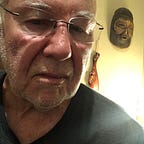William Burroughs Goes to Heaven
Recurrence says we live it until we remember it
As a young atheist, I was a fan of Bertrand Russell and Mark Twain, The Marquis de Sade, and Jim Thompson. I was methodically reading all the best literature in the public library when one day my feet headed to a strange land.
Most peculiar.
I asked my feet where they were bound and they said China, which seemed an arch comment for flat feet. William Burroughs said if there’s a psychic ability we have more of it in a big toe than in the brain.
My shoes parked me in front of a shelf of books on philosophy and religion. My arm reached up and my hand closed on “Psychological Commentaries on the Teachings of Gurdjieff and Ouspensky,” by Maurice Nicoll.
I flashed on Peter Sellers in Dr. Strangelove when one arm would involuntarily shoot straight out in a Nazi salute. He tried to hold it down but it had a will of its own. My arm shot straight out and came back with a book of esoterica.
When I read it I paused and reflected when I got to the passage that read, “If you find this work in one recurrence, you’ll be looking for it and will find it earlier in the next.”
Carl Jung said something along the same lines.
He said the Self is an archetype, which can extend into time, but exists independent of time. So he’s saying pretty much the same thing, that the film of a life runs sequentially and then goes back into the can until the next showtime. And there’s the rub. If it’s the same film every time what does it matter? It’s indistinguishable from last time, and nothing changes.
This was the dilemma in the film, Groundhog Day.
Phil (Bill Murray) stepped in the same puddle every day until he remembered the puddle was there and paused inside the moment when he always stepped in it. He self-remembered instead of following the unconscious pattern. Patterns are mechanical and so long as we identify with them, so are we. “The Work” is about freedom, which is being under as few laws as possible, and those of our own choice or making.
But what was that about hats?
John Cleese, in a biography, was asked his favorite book. He said the Commentaries. He added that people who have these books on their shelf are not like other people. The Monty Python skit, “People aren’t wearing enough hats,” derives from his love of this collection of lectures by Dr. Nicoll.
“The Work” has no morality to impose on the practitioner, with the exception of a good householder qualification. At least demonstrate that you can survive on your own. Nothing is imposed because it is antithetical to the process, which is to eliminate negative, or one-sided emotions so as to identify with an objective center. The good householder gig should be covered by age thirty or so, or, if you’re Elon Musk, twelve.
After that, the path can be strange. William Burroughs, for example, described the day he shot his wife as being one where he was in the possession of an evil spirit. There was a deep dread and foreboding. The emotion attached to the act, he remembered. The act itself he did not remember. Not yet.
From the conscious point of view what he was going to do was deeply wrong, and he would not do it at a conscious level. The unconscious on the other hand is amoral. It knows the entire pattern, not just the part extended into time, and it has an intention.
The ego can inhibit what it knows about but not what is withheld from it. This was the case with General Edward Cummings in The Naked and the Dead. His shoes walked him right into boy’s town.
Burroughs talked and wrote about, “the film of your life,” of breaking it up and running it forward and backward. This breaking up of the linearity runs through other writers, such as Kurt Vonnegut and Quentin Tarantino. Burroughs famously used cut-ups, a technique Brion Gysin showed him, but which he traced back to Hassan i Sabbah and Omar Khayyam, when they were students back in the second century.
I saw William Burroughs on the night he died. I didn’t know he was dying. It was in that background consciousness, a timeless place, where location is irrelevant because there is no distance between things.
He was coming down the hallway in a military barracks. It was a “men’s house” dream. Nothing feminine was there. Burroughs was wearing boxer shorts and a t-shirt. There was an overlapping sequence not separated in time, but simultaneously perceived, of a big military transport truck and driver, waiting outside. The motor was running.
As he came down the hallway, Burroughs said, with his distinctive, sardonic tone, “I don’t need a driver. I can drive myself.”
